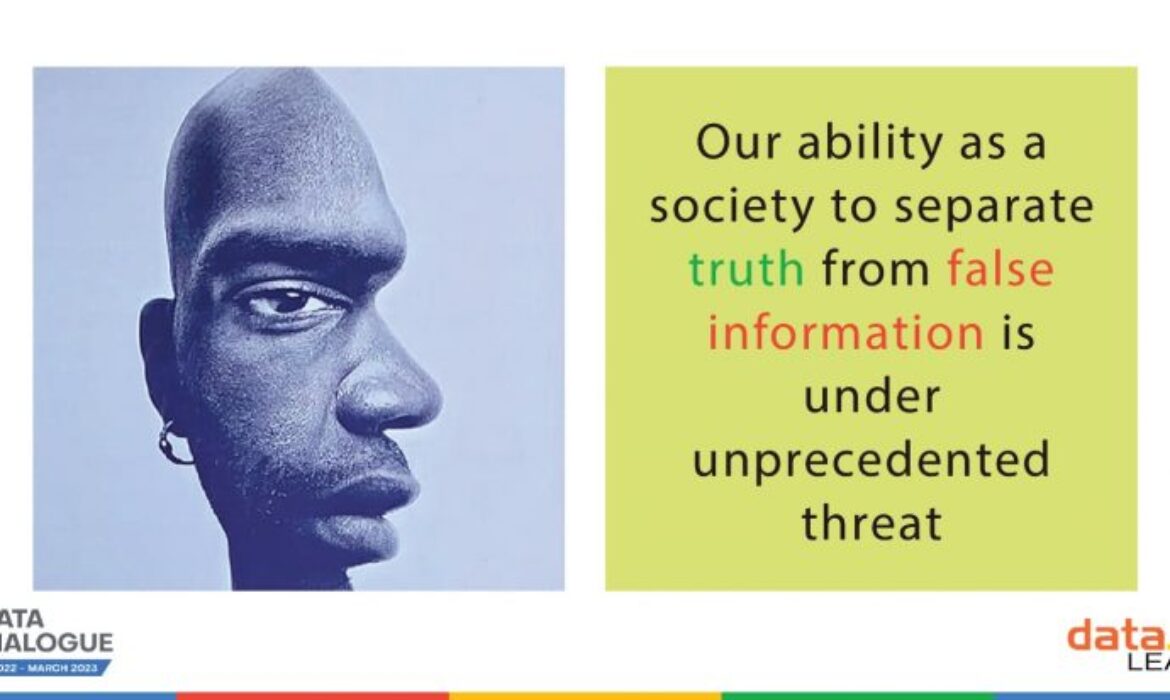Being a Responsible Communicator helps you Build your Online Reputation
Globally, Data journalism has had a transformative impact on content publishing standards. Reporters, Journalists, Content writers, freelancers, social media users, bloggers, and website or content publishers need to carry out more accurate, transparent, and fact-led storytelling.
April 2 is an International Fact-Checking Day.
Google presents advanced ways on how can you find trustworthy information. Now, wherever you’re searching, you’ll see three dots next to most results on Google Search. Tapping those three dots gives you more about the background, why this page, who wrote this page and reviews from others. It will help you discover and establish more credibility for your searches. Also, these would populate organic search results not driven by paid ads.
Use the right strategies, access the right tools and follow techniques to gather and analyze information before publication. This is critical to maintaining your online reputation.
Responsible communications ensure you maintain and empower your online reputation. Building a strong online reputation requires a strategic and consistent approach. It helps you gain a competitive advantage, attract top talent, manage crises, engage with customers and influence stakeholders. Improved brand recognition enables you to win new customers, enhances customer loyalty and helps you build an overall increased market share.
While communicating, the tone of voice of your messages significantly impacts how the public perceives you and your brand. By using the right strategies, communicators can establish credibility, build trust, and engage the audience, ultimately increasing the effectiveness of their communication.
You can use the following best practices to develop your communication skills:
Transparency: Be candid, truthful and open in all communications. Try to provide accuracy to the information you are sharing and do it honestly. While in most cases, the juggle is when to make an announcement; it’s recommended to wait, announce, and publish what is definitive.
Promptness: Minimizing delays in reverting to customers or stakeholders in day-to-day communications helps establish more robust relationships. It demonstrates your readiness to handle projects and affirms your intent to the client for positive decision-making. Delayed transmissions lead to miscommunication or reputational harm.
Respectful: Interaction with customers and stakeholders demonstrates you and your personality traits. Dignity, respect and values are crucial to maintaining relations with professionals, staff, well-wishers, partners and media. In the social media era, there is little scope for ‘Being-on-stage’ or ‘Being-back-stage’. Hence, to maintain your online reputation, it is most effective to always communicate with respect. Paying attention to feedback and queries helps build your connections stronger across geographies.
Adapt Inclusivity Since the world is a stage now, one must learn to communicate inclusively. For years, we trained ourselves to speak with a particular group or a segment of people; now, you need to be careful in the choice of words, thereby not impacting or pointing towards any section of society. To ensure this, adopt Inclusivity in your approach. Make sure all members of your audience can access and understand your communication. Take into account any potential linguistic and cultural hurdles.
Consistency: To influence your customers and stakeholders and to establish your narrative or point of view as an expert, it’s essential to convey your ideas consistently. While consistent messaging does not mean repeated messages, it needs progressive consistency. Make sure that the message is delivered through all channels of communication always.
Take charge and be proactive: As a responsible communicator, you need to be able to think through and plan should there be any potential challenges or outcomes post your communications. Consider potential problems in advance and deal with them before they become more significant problems.
Improvisation:
- Use feedback and data to pinpoint improvement areas to monitor and tweak your communications.
- Employ straightforward, uncomplicated language that your audience can understand.
- Avoid using jargon or technical phrases that could be confusing.
Citations:
Zraková, Diana, Kubina, Milan, and Koman, Gabriel. “Influence of Information-communication System to Reputation Management of a Company.” ScienceDirect, 22 Jun. 2017, https://doi.org/10.1016/j.proeng.2017.06.172.
Oh, Jeyoung, and Ki, Eyun-Jung. “Factors affecting social presence and word-of-mouth in corporate social responsibility communication: Tone of voice, message framing, and online medium type.” ScienceDirect, 12 Apr. 2019, https://doi.org/10.1016/j.pubrev.2019.02.005.
Reach me at my email: rachana@mediavalueworks.com
About the author: Rachana Chowdhary
Rachana Chowdhary founded an innovative global communications agency – MediaValueWorks, in 2013. She has over 23 years of experience across traditional and digital media, PR, branding and marketing strategies, and strategic content management. A graduate of Mumbai University, she also mentors women entrepreneurs and small and medium businesses.

Rachana Chowdhary
Global Content and Communications Leader
Forbes Council Member
Founder – MediaValueWorks – Communicate Globally
CEO – MVW-MSME Development Centre
Publisher – India-Press-Release.com & InstaaPR
Editor – IndiaTechnologyNews & Bollywoodtimes
MVW Network International Pvt Ltd.
Mumbai | New Delhi | Bengaluru | Singapore | San Francisco | Toronto
Brand Consulting, Content & Design, Digital Marketing & Events
Content Publishing across 125 countries in over 45 languages
Member – Public Relations Society of India
Jury – APAC Stevie Awards
Awards and Recognitions –
2022: 100 Most Important Professionals by Reputation Today
2021-22 Woman of Excellence Award – By Indian Achievers’ Forum
2017 Leading Women Entrepreneur of India – World Marketing Federation
2016 Best Marketing Outreach India-Africa – By ASSOCHAM
(Picture credit-20th Data Dialogue in New Delhi)
Role of Digital PR in 2023 Opportunities and Challenges
In 2023, digital PR will become even more critical for businesses and organizations as the world becomes increasingly digitalized. The role of digital PR professionals will involve crafting and disseminating content through various digital channels, such as social media, online news outlets, and industry-specific websites, to shape public perception and build brand awareness. This will include creating and distributing press releases, crafting and publishing thought leadership pieces, and leveraging influencer marketing to reach key audiences.
One of the main challenges digital PR professionals will face in 2023 is the sheer volume of content being produced and distributed online. With so much noise and competition, it will be important for digital PR professionals to be able to create and distribute content that stands out and captures the attention of their target audiences. This will require a deep understanding of the latest trends and technologies and the ability to think creatively and strategically about how to reach and engage different audiences.
Another significant trend likely to continue in 2023 is using data and analytics to measure the impact of digital PR campaigns. Digital PR professionals will be expected to be able to use a variety of tools and platforms to track and analyze key metrics, such as website traffic, social media engagement, and media coverage. Using these tools, digital PR professionals can identify what is working and what isn’t and make data-driven decisions about adjusting their strategy to achieve better results.
In addition to these trends, in 2023, digital PR will also involve working closely with other teams such as SEO, CRM, Data Science and Business Development. SEO will help drive organic traffic and improve the website’s visibility on search engines. CRM will help to manage and maintain customer relationships. Data science will help to analyze data and make data-driven decisions. And business development will help to drive sales and revenue.
In 2023, digital PR professionals will need to be versatile and able to adapt to the ever-changing digital landscape to help their clients succeed. They will also need to be well-versed in the latest technologies and platforms, such as chatbots, virtual reality, and blockchain, to stay ahead of the curve and relevant in a constantly evolving industry.
There are several challenges that digital PR professionals will face in 2023:
- The increasing volume of content: With so much information and content being produced and distributed online, it will be challenging for digital PR professionals to create and distribute content that stands out and captures the attention of their target audiences.
- The need for personalization: Audiences are becoming increasingly segmented and targeted, and digital PR professionals will need to create personalized content that speaks to specific groups to be effective.
- The use of AI and automation: While AI and automation can help digital PR professionals to scale their efforts and reach a larger audience, they will also need to be able to use these tools effectively and understand their limitations to avoid negative consequences.
- The importance of data and analytics: Digital PR professionals will need to be able to use data and analytics to measure the impact of their campaigns and make data-driven decisions.
- The need to stay up-to-date: The digital PR industry is constantly evolving, and professionals will need to stay up-to-date with the latest trends, technologies, and best practices to be effective.
- The need to work closely with other teams: Digital PR professionals will need to work closely with other teams, such as SEO, CRM, Data Science and Business Development to achieve overall business objectives.
- The need for ethics and transparency: With the rise of disinformation and fake news, it will be important for digital PR professionals to ensure that their campaigns are ethical and transparent to maintain trust and credibility with their audience.
- The need for crisis management: With the rise of social media and the ability for information to spread quickly, it will be important for digital PR professionals to be prepared to handle crisis situations and mitigate any negative impact on their client’s reputations.
To face the challenges of digital PR in 2023, digital PR professionals can take the following steps:
- Stay up-to-date with the latest trends and technologies: To create and distribute content that stands out and captures the attention of their target audiences, digital PR professionals will need to stay up-to-date with the latest trends and technologies in the Industry.
- Personalize content: To effectively reach and engage with their target audiences, digital PR professionals will need to create personalized content that speaks to specific groups. This will require a deep understanding of the target audience and the ability to create content that resonates with them.
- Use data and analytics: To measure the impact of their campaigns and make data-driven decisions, digital PR professionals will need to be able to use a variety of tools and platforms to track and analyze key metrics, such as website traffic, social media engagement, and media coverage.
- Leverage AI and automation: To scale their efforts and reach a larger audience, digital PR professionals can use AI and automation to analyze data, create content, and distribute it at a faster rate.
- Work closely with other teams: To achieve overall business objectives, digital PR professionals will need to work closely with other teams such as SEO, CRM, Data Science and Business Development.
- Maintain ethics and transparency: To maintain trust and credibility with their audience, digital PR professionals will need to ensure that their campaigns are ethical and transparent.
- Have a crisis management plan: To handle crisis situations and mitigate any negative impact on their clients’ reputation, digital PR professionals will need to have a crisis management plan in place.
- Continuously learn and develop new skills: As the industry is constantly evolving, digital PR professionals will need to continuously learn and develop new skills to stay relevant and effective.
In 2023, digital PR will be more important than ever, and digital PR professionals will need to be skilled at creating and distributing high-quality content, leveraging the latest trends and technologies, and using data and analytics to measure and improve their campaigns. They will also need to work closely with other teams and be versatile to adapt to the ever-changing digital landscape.
Contact us to learn how we can help you develop a better Marketing Strategy for your business.
Credits:
Content: Keshav Bhardwaj
Publisher: Media Value Works
Social Media: Ravish Dhiran


